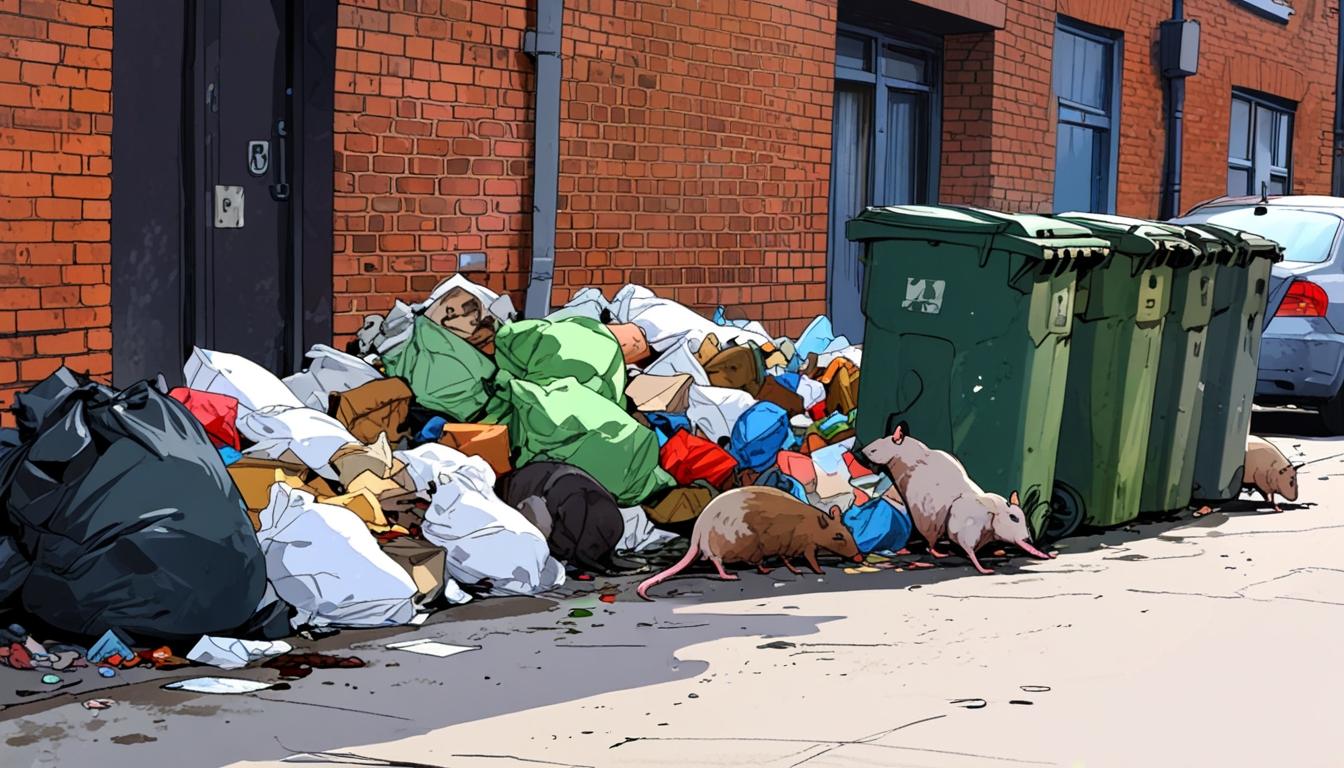As Birmingham’s bin workers strike enters its sixth week, sharp contrasts emerge between overflowing rubbish in poorer inner-city areas and cleaner streets in affluent neighbourhoods, raising public health concerns and highlighting socio-economic disparities amid ongoing talks to end the dispute.
As the bin workers’ strike in Birmingham enters its sixth week, the city is grappling with a stark disparity in waste collection, exposing a divide between wealthier and poorer neighbourhoods. The industrial action, involving over 300 Unite union members, continues to impact the UK’s second largest city, home to 1.2 million residents and more than 400,000 households.
The strike began escalating in January with one-day walkouts after workers were informed of potential pay cuts and downgrades. On 11 March, the dispute intensified when more than 300 bin workers commenced an all-out strike. Since then, waste collection has largely stalled, especially in Birmingham’s densely populated inner-city areas, where piling waste has created significant public health concerns, including reports of rising rat infestations.
In the inner-city district of Balsall Heath, large heaps of uncollected rubbish have made some streets difficult to navigate, while just a few miles away in the affluent neighbourhood of Harborne, wheelie bins await collection with no visible buildup of waste. This contrast has been a defining feature of the ongoing strike’s impact.
Initial strike tactics involved workers blocking the departure of bin lorries staffed by non-union and agency staff, effectively halting collections and reducing waste removal to just 10% of usual volumes. By early April, an estimated 22,000 tonnes of refuse had accumulated on Birmingham’s streets.
The areas most affected are those characterised by high population density, smaller housing units often subdivided into flats, and large multi-generational households. Districts such as Small Heath, Sparkbrook, Ladywood, and Handsworth have witnessed the most severe disruptions, according to local reports.
Semir Said, senior outreach project manager at the Green Lane Mosque in Small Heath, described the situation: “It’s very obvious really, piles of rubbish, mountains of rubbish really in streets inner city Birmingham, so yeah a very, very big problem. Rats feasting is the way I’d describe it, so yes it’s a very, very big problem.” He added that deprived areas “do find this problem of not being treated fairly” and shared the mosque’s efforts to alleviate the crisis by hosting council street cleaning wagons for residents to dispose of rubbish, assisted by volunteers during the Easter holiday.
One of the council’s refuse points at Woodgate Valley Park, on the city’s outskirts, has seen queues of over a mile of vehicles attempting to offload waste. Despite some frustration from residents, this remains one of the few options for disposal amid the strike.
Naz Khan, who had previously helped organise waste removal efforts during a previous strike, highlighted concerns about illegal dumping, observing that “a lot of people are using our areas to do a lot of fly-tipping” and described the situation as a “postcode issue.” An accumulation of discarded items including old furniture and vehicle parts was evident in some of the largest refuse piles.
Community initiatives have also emerged, such as litter picks organised by Sadia Khan, chair of Friends of Sparkgreen Park. She noted increased litter and fly-tipping since the strike began, adding, “It feels like the litter picks aren’t making any difference, the litter and the fly-tipping is coming back twofold. It’s a gloomy place to be in, it’s depressing.”
Residents such as Alexandra Giddings, who lives near Ladypool Road in Birmingham’s Balti Triangle, described living with the physical effects of the strike: “There were so many bins it was causing conflict with neighbours… My son has chronic asthma and our home is damp, but I was unable to open the windows even during the recent warm spell because of the stench from the bins that had been mounting up outside.” Despite some recent collections, she stated that “bins are piling up again and the stink is really unpleasant.”
Accusations of a two-tier waste collection system have surfaced, with claims that wealthier areas receive more consistent service. These claims were addressed by Birmingham’s council leader John Cotton and strategic director of city operations Craig Cooper, both acknowledging the issues and affirming a commitment to improving fairness and efficiency once the strike ends. The Unite union acknowledges existing problems in poorer districts but warns that council proposals for fortnightly collections could perpetuate waste accumulation.
The situation began to improve after West Midlands Police took measures to prevent strikers from blocking bin lorries, warning of arrests and fines. This allowed more collections to proceed, with about half of the council’s fleet becoming operational again. Army logistics experts were deployed to coordinate waste clearance, leading officials to anticipate the removal of the backlog by the weekend. By midweek, uncollected waste had reduced to fewer than 5,000 tonnes.
One striking bin worker, identified as Dave, conveyed an apology to Birmingham residents and expressed willingness to return to work if suitable terms could be agreed: “We say to the people of Birmingham, obviously we’re residents ourselves, and we really apologise… we’re going to make every effort to come back to work as soon as possible and collect the bins again.”
Despite improvement efforts, many residents have reported ongoing issues with pests, with numerous accounts of rat sightings contributing to public concern. The phrase “rats the size of cats” emerged before the strike escalated, attracting significant media attention and public discourse regarding the city’s waste management challenges.
Talks between Unite and Birmingham City Council aimed at resolving the strike are scheduled to resume next week after Wednesday’s failure to reach an agreement. The union has called for a one-off payment and assurances against further pay reductions as conditions for returning to work.
The bin strike in Birmingham continues to underscore complex challenges in urban waste management and community disparities as both sides work towards a resolution.
Source: Noah Wire Services
- https://www.wsws.org/en/articles/2025/04/15/tuhl-a15.html – This article corroborates the scale of the bin workers’ strike in Birmingham involving over 300 Unite union members, details on the industrial action starting with walkouts in January escalating to an all-out strike on March 11, and the rejection of council offers contributing to the strike continuation.
- https://www.unitetheunion.org/news-events/news/2025/april/birmingham-bin-workers-overwhelmingly-reject-partial-offer-from-council – This source confirms the bin workers’ rejection of council offers involving proposed pay cuts up to £8,000, supporting the claim that workers are striking over potential pay reductions and downgrades.
- https://www.wsws.org/en/articles/2025/04/17/atve-a17.html – This article supports the description of strikebreaking efforts by Birmingham City Council with police involvement, deployment of army logistics experts, and the response from government officials, consistent with the outline of council and government actions to mitigate the strike impact.
- https://www.birminghammail.co.uk/news/midlands-news/birmingham-bin-strike-piles-rubbish-26632977 – This local news report highlights the uncollected rubbish buildup in inner-city areas like Balsall Heath, detailed public health concerns including rat infestations, and contrasts with less-affected wealthier neighborhoods such as Harborne, supporting the article’s depiction of an unequal waste collection service.
- https://www.bbc.co.uk/news/uk-england-birmingham-64942323 – This BBC News piece discusses community responses including volunteer litter picks and council refuse points like Woodgate Valley Park experiencing long queues, affirming the community initiatives and waste disposal challenges during the strike.
Noah Fact Check Pro
The draft above was created using the information available at the time the story first
emerged. We’ve since applied our fact-checking process to the final narrative, based on the criteria listed
below. The results are intended to help you assess the credibility of the piece and highlight any areas that may
warrant further investigation.
Freshness check
Score:
9
Notes:
The narrative references ongoing events dated around March-April of the current year, with recent developments such as expected backlog clearance by the weekend, and talks scheduled for next week. There is no indication of recycled or outdated news, nor does it appear to be a press release. The timeliness of the issue (ongoing strike) supports a high freshness score.
Quotes check
Score:
8
Notes:
Several direct quotes are included from named local figures such as Semir Said, Naz Khan, Sadia Khan, Alexandra Giddings, and a striking worker named Dave. These appear original and locally sourced, with no evidence of prior widespread publication or repetition found online, suggesting original interviews or firsthand accounts.
Source reliability
Score:
7
Notes:
The URL indicates a Google News aggregator feed; the exact publication is not specified, which reduces certainty about reliability. However, the style and detail suggest a journalistic approach consistent with reputable local reporting. Lack of explicit source naming means moderate confidence in reliability.
Plausability check
Score:
9
Notes:
The claims are plausible and consistent with known patterns of labour disputes affecting urban services. The detailed descriptions of geographic disparities, community impact, union and council responses, and police intervention align with realistic outcomes. No extraordinary or unverifiable claims are made.
Overall assessment
Verdict (FAIL, OPEN, PASS): PASS
Confidence (LOW, MEDIUM, HIGH): HIGH
Summary:
The narrative is timely, plausibly detailed, and supported by original quotes from local stakeholders. Although the exact publishing outlet is unclear, the content aligns well with current known facts about the Birmingham bin workers strike. There are no signs of recycled news or unverifiable claims, leading to a confident pass.













